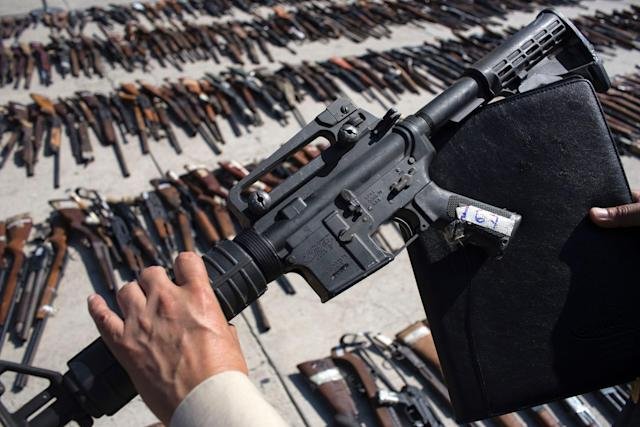13 U.S. States Back Mexican Lawsuit, Blame Gun Companies for Exporting Violence
Source: GUILLERMO ARIAS/AFP via Getty Images
Two weeks ago, 13 U.S. states, joined by the countries of Antigua and Barbuda and Belize, filed briefs in support of the Mexican government’s lawsuit against 10 gun companies in a U.S. federal court. In the suit, filed in August 2021, Mexico blames U.S. gun manufacturers and distributors for fueling the flood of weapons that are smuggled across the border and into the hands of drug cartels. The defendants, manufacturers Smith & Wesson, Barrett, Beretta, Century Arms, Colt, and Ruger, as well as distributor Interstate Arms, asked the judge to dismiss the suit, citing protection under the Protection of Lawful Commerce in Arms Act (PLCAA), which shields gunmakers from being sued for the misuse of their products. The Mexican government countered, asserting that the PLCAA only pertains to injuries occurring in the United States. Mexico is now backed by 13 Democratic attorneys general, who claim that even if the PLCAA applied extraterritorially, the defendants’ facilitation of weapons trafficking to the cartels is beyond the scope of PLCAA protection.
The lawsuit comes amid a decades-long drug war that has claimed the lives of over 150,000 Mexicans, many of them shot dead by traffickers armed with U.S.-made guns. Mexico’s stringent gun laws ban virtually all firearm sales, so the cartels rely on stolen and foreign weapons to wage war on rivals and the authorities. An ATF report found that between 2014 and 2018, 70% of traced guns recovered from crime scenes in Mexico originated in the U.S. Of particular concern to the Mexican government is the M82, a semi-automatic rifle made by Barrett Firearms that has become the cartels’ weapon of choice and a status symbol among traffickers. The rifle is powerful enough to penetrate bullet-proof vests and down helicopters, posing an enormous threat to weak police departments and leaving the Mexican military as the only force with the necessary firepower to fight back. The Mexican government says that the rifle’s outsized role in cartel violence is the reason that Barrett was included in the 2021 lawsuit, despite producing fewer Mexico-bound weapons than the other manufacturers named in the case.
Despite the prevalence of American guns in cartel violence, placing the blame on the manufacturers and distributors of the weapons is not an easy task. Critics of the lawsuit argue that the Mexican government should focus on punishing the smugglers who bring the guns into the country instead of the U.S. gun companies, who they say are not responsible for how their weapons might be used after they are sold legally in the United States. Mexico, however, claims that U.S. firearm manufacturers have been deliberately marketing to illegal Mexican buyers with products like a Colt pistol that depicts a Mexican revolutionary hero. They also accuse distributor Interstate Arms of selling weapons to buyers who are, argues Mexico, obviously working on behalf of the cartels.
Legal experts say the lawsuit is unlikely to succeed because even if gun companies are responsible for cartel violence, it will be difficult to prove their criminality, and Mexican-themed engravings for one are not explicitly against the law. Whatever the outcome of the lawsuit in the Boston federal court, it could bring attention to weapons trafficking by cartels and spur President Joe Biden, who has voiced his commitment to the repeal of the PLCAA, to action on gun regulations. In the case of the 13 supporting states, the attorneys general’s actions come amid legislation in the states of California and New York aimed to make it easier for their citizens to sue gunmakers.
Although Mexico’s suit is the first to be brought by a national government against gun companies in the U.S., it is not without precedent in the ongoing battle between gun control advocates and the companies that profit from the sale of firearms. An accusation of illegal marketing, similar to the one brought by the Mexican government, has been effective in extracting a $33 million settlement offer from Remington, a firearm manufacturer that was sued by the parents of the victims of the Sandy Hook school shooting for recklessly marketing the rifle that was used in the massacre.
For decades, the debate over gun control in the United States has centered on the deadly consequences of gun violence on U.S. soil while another crisis has unfolded south of the border. Regardless of one’s view on domestic gun laws, the dire need to prevent cartels from acquiring U.S.-made weapons is easy to see; the homicide rate in Mexico is as high as it has ever been and shows no sign of slowing, even during the Covid-19 pandemic. Solving the problem, however, is trickier. If Mexico’s lawsuit succeeds, the burden will fall on firearm companies to prevent their weapons from reaching the cartels. More likely, it will be up to the governments of the United States and Mexico to take action on the trafficking of guns across their shared border, through stricter gun laws or more vigorous customs enforcement.

